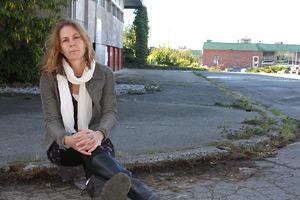by Kyle Wells [email protected] “Get a job, you lazy bum.”
It’s a common phrase that we have all heard at one time or another. Many of us may have used it, or at the very least thought it, maybe when asked for change or while watching someone collect cans and bottles for recycling. The thought says ‘I work hard for the money that I earn, why can’t this person do the same?’ It says ‘there is obviously something wrong with them and it is their fault.’ It says ‘it’s not my problem.’
Alof!i Consultancy founder, researcher and one of the authors of Powell River Homelessness Partnering Strategy report Christien Kaaij said it surprised her to learn, during her research, just how easy it is to cross that line into homelessness. Some have obvious mental health problems. Some struggle with addiction. Yet there are others who are simply struggling to make ends meet, who have run into misfortunes beyond their control or do not have support networks that others are blessed with.
“You’re raised that you know...if you work hard enough, you can make something of your life,” said Kaaij. “I really believed that for a long time. In my 30s I started seeing that maybe that’s not always true. We don’t all come from a background where we have support we can fall back on, or where we have friends we can rely on, or if we had the opportunity to have a good education.”
Some in the position of homelessness find the attitude toward them most often dismissive and, to their mind, ignorant of the realities behind their circumstances.
“People don’t care,” said Kelly Reid, who has lived in and out of homelessness for five years. “It seems like they will turn their head the other way and be like ‘whatever.’”
Reid and others, who spoke to the Peak at Powell River Community Resource Centre (CRC), said they hear people telling them that they put themselves in their positions. Many are on disability assistance or are unable to function in a working environment. Many have not had the privilege of a healthy start that helps lead to education, career or family, our society’s common measures of success. Add into the mix a mental disability or a drug or alcohol addiction and the potential to end up homeless is far greater.
“I think that’s something the general public should start understanding, that this can happen to you, to me, to your kids, to your friends,” said Kaaij.
Getting out of a situation of homelessness is not easy either. Maintaining a job requires keeping up appearances and being well fed and rested, something that can be difficult for a person struggling to find or keep adequate housing. Many who do find work end up in minimum wage jobs, living from paycheque to paycheque with no room for error.
The tightness of a community like Powell River comes with its own problems for those struggling to make ends meet. Many people were unwilling to have their names in the paper because of the stigma attached to being homeless or on income assistance. It doesn’t take long for someone to earn a reputation of being unreliable or of being a “bum” and that reputation can be hard to shake when looking for a second chance.
In a city the size of Vancouver a person can receive what services they need and remain anonymous doing it. When dealing with landlords or looking for employment they don’t have to worry about having preconceived notions held against them.
CRC manager Liz Lane said rumours abound in Powell River of a “blacklist” of people that landlords believe to be untrustworthy. Whether or not such a list actually exists is hard to say, but regardless, most people, once homeless, find it tough to rebound no matter how determined.
“I think there’s a distaste on the part of some people out there for ‘those people,’” said Lane. “People probably don’t really recognize how difficult it is to live on very little money.”
This is part two of a series of articles on hidden homelessness in Powell River.



